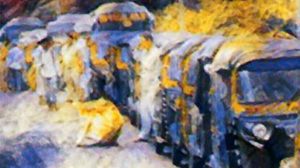
Several macaques scurried across the wires that stretched above the street as the motorized rickshaw stopped abruptly, halted by the traffic jam ahead of it. The driver slammed his hand down hard several times on the horn, as from behind his seat, Arjun pounded on the back of the seat, sending vibrating jolts through the driver’s entire body.
“My son, my son!” Arjun screamed.
The driver pressed down on the horn, not letting up. Its constant blare shrill as the cry of a terrified peacock. The street they were on and the streets leading to it, also clogged with traffic, was consumed by the cacophonous noise of cars, trucks, motorbikes, rickshaw horns, and yelling from angry drivers.
“Go around,” Arjun yelled at the driver, pushing his fist into the man’s shoulder.
“There’s nowhere to go,” the driver said. “Have patience.”
A macaque sitting on a storefront awning tossed aside the piece of mango rind it had been chewing on, jumped onto the roof of the taxi, peered over the edge, and stuck its open hand in front of the driver’s face. The driver batted the monkey’s hand away. “Filthy creatures,” he snarled.
The macaque pulled back, then a moment later leapt into the street and ran between the stalled vehicles until it was lost from sight.
“Oh, my poor Ivaan,” Arjun wailed as he slumped against the back of his seat, rending his shirt. Tears streamed down his face.
Waves of heat and dust-filled air drifted in and out of the inside of the rickshaw, carrying the aromas of cooked pork, fish, and hot oils from the food vendors that lined the sidewalks.
The driver looked into his rearview mirror and seeing the anguished Arjun frantically slapping the sides of his head, turned and with all the sympathy he could muster, said, “It’s not far. If you’re able, run the rest of the way.”
Without hesitating, Arjun jumped out of the rickshaw, kicked off his sandals, and began to run. Following the same direction as the macaque, he weaved in and out of stopped vehicles, barely averting colliding with pedestrians crossing the street. He measured the distance as he ran by the slapping of his bare feet on the hot pavement, counting in his head, losing count, and then counting again each step. With each stride, unconsciously his mouth contorted into his son’s name, “Ivaan.”
Clinging to the sides of the buildings, sitting on the balcony railings, and hanging from the eaves, the macaques silently watched him run by.
When he reached the hospital he barreled through the glass doors, pushing aside others until he reached the front desk. Covered in sweat, breathless, he collapsed across the desktop. “My son, Ivaan, where is he?”
Sitting at a computer, the nurse looked up at Arjun. “Ivaan, who?” she said with a practiced, patient smile. Her face was a mask.
“Khatri. Ivaan Khatri. I’m his father. He’s only twelve.”
She typed on the keyboard, her fingers skimming quickly across the keys. Done typing, she gazed up at him with the same patient expression. “He’s in surgery now,” she said. “The sixth floor.”
#
In the sixth-floor waiting room, Arjun paced back and forth as he stared at his cellphone. The operating rooms were nearby and each time one of their doors opened, antiseptic fumes wafted out. He knew the nurse behind the desk was watching him, had been watching him, from the moment he vaulted from the elevator and began screaming his son’s name as if it were the normal thing to do in a hospital. She had quickly calmed him down by having him fill out all the necessary paperwork, but her watchfulness was a sign of her mistrust of his ability to control himself. She was right. Arjun pushed the same numbers on his cellphone for the tenth time and screamed at it when no one picked up at the other end.
Ivaan’s teacher, Mr. Patel, who had ridden in the ambulance with Ivaan when the boy was brought to the hospital and had called Arjun to tell him his son had been seriously injured, sat silently in a chair next to a bank of windows, staring out at the Arabian Sea. The thick, billowy clouds foretelling of the coming monsoon hung above the horizon like a mass of white-feathered egrets seeking a place to land. After telling Arjun how serious his son’s injuries were after falling from the high wall that circled the school, he took little notice of Arjun, keeping his distance, fearing the father would blame him for Ivaan climbing the wall, to begin with.
A nurse in a surgical gown, with a mask across her face, came out of the operating room that Ivaan was in, passed by Arjun without acknowledging him, and went down the long hospital corridor before disappearing into another room. Arjun stared at her open-mouthed as she walked the entire distance, hoping she would give him a sign that his son would be okay. Her now out of sight, he returned to pressing the buttons on his cellphone. At last, when his brother’s voice sounded at the other end, he said, “Rahul, where have you been? I’m at the hospital. Ivaan is in surgery now. They believe he has a brain injury caused by a fall from a wall that his idiot of a teacher allowed to happen.”
#
Arjun sat by the hospital bed, holding his son’s hand. Nurses came in and out of the room, checking the bags of IV fluids that hung from metal poles with tubes stretching to Ivaan’s arms and monitoring the beeping of the machines connected to his son via electrodes attached to plastic pads taped to his chest and head. The entire top of his head was wrapped in gauze bandaging, replacing the boy’s thick, curly hair that had been shaved off.
Rahul walked into the room and stopped at the foot of Ivaan’s bed. “How’s he doing?” he said to Arjun.
Arjun looked up at his older brother. “They were able to stop the bleed in his brain, but there’s still swelling. His recovery will take a long time and they have no idea if the damage will be permanent.”
“We must all pray and have hope,” Rahul said.
Arjun raised his son’s hand to his lips and gently kissed it. “I can never afford the hospital bills and all the at-home care this is going to cost,” he said. “I’ll need to quit my job to take care of Ivaan. My bank account is empty. All I have are the gold and silver bracelets and some rings that belonged to Lata and are in a safe deposit box.”
Rahul cleared his throat. “It’s none of my business, but couldn’t your father-in-law help? He’s a very wealthy man.”
“Have you forgotten? He disowned Lata when she married me. He thinks I’m no better than an untouchable. He hasn’t seen Ivaan in years and has shown no interest in my son’s well-being even after Lata’s death.”
Rahul looked at Ivaan and then back at his brother. “I’m not a wealthy man at all, but I’ll help in whatever ways I can.”
“Thank you. I promise I’ll repay you every rupee you give me.” Arjun said. “I plan on suing the school and will repay you with whatever I get.”
#
Ivaan lay inert in his bed, covered with the blanket that had been his mother’s favorite, but kept in a trunk since her death four years before. He stared blankly up at the ceiling, his eyes devoid of any thoughts hiding behind them. A feeding tube was inserted into his nose. Arjun entered the room carrying a pan of warm, sudsy water, and a washcloth and towel draped over his shoulder. He placed the pan on the table next to the bed, flattening the stack of unpaid medical bills that had laid there for nearly a month. In the stack was a threatening letter that he must pay the physiotherapists who had come in three times a week to tend to Ivaan or they would take him to court.
“Good morning, my dearest Ivaan,” he said. “It’s time for your daily bath.”
He removed the blanket, neatly folded it, and placed it at the foot of the bed. Gingerly, he raised the boy to a sitting position and held him in place with one arm while removing his pajama top. He lowered the boy back on the bed, dipped the washcloth in the water, wrung it out a bit, and then began bathing his son.
Outside the window, a macaque that Ivaan had fed regularly and named Bobo tapped on the glass several times before giving up and leaping onto the nearest tree branch and disappearing in the foliage.
Arjun had just finished washing the lower half of his son’s body when there was a loud rapping on the front door. He quickly covered his son with the blanket and left the room. He opened the front door and was surprised to see Mr. Patel standing there. The teacher’s face was red with rage.
“I’ve been fired from my position because of your lawsuit against the school,” he said between clenched teeth.
“The lawsuit was tossed out of court. I lost,” Arjun said.
“The school said I had been negligent in my duties and hadn’t properly supervised your boy,” Mr. Patel said, his voice raised to a high pitch. “I told Ivaan several times to stop climbing that wall and he didn’t listen. I had a whole schoolyard of children to watch. Your son snuck behind my back and climbed the wall for the last time.”
“I’m so sorry,” Arjun said. “I didn’t mean to get you fired.”
“What did you intend?”
“To get money to pay for my son’s care until he’s better,” Arjun said. “If it weren’t for the generosity of my brother, Ivaan would be dead, but my brother is not wealthy either and even he has limits on how much he can give me.” He held out his hands, displaying his empty palms. “I’m penniless.”
“And soon I will be too,” Mr. Patel said. “And that will be your fault, and your son’s fault.”
“He’s just a boy,” Arjun said.
“May Diti take out her vengeance on him and on you.” The teacher turned and stormed away.
Arjun closed the door and leaned back against it. “What have I done to deserve this?” he said as tears streamed down his face. He took his cellphone from his pocket and pushed the numbers to reach his brother. When his brother came on, he said, “Rahul, can you and your wife watch Ivaan for a couple of days? I’m going to try and get the money I need to take care of Ivaan and repay you, as I promised I would do? I must go see Ivaan’s grandfather.”
#
Arjun stared out the train window as it passed what looked like hundreds of high-rise apartment buildings on the outskirts of Mumbai. He had always lived in the crowded part of the city and wondered how much different his life would have turned out if he had received an education and had been able to afford to live in a tall, well-managed apartment building like the ones he was looking at. Lata had never complained about their small apartment in the city, but she rarely complained about anything, despite coming from an affluent family in the city of Kochi, where he was headed.
Beyond Mumbai, the landscape was open scrubland, small farms, and homes scattered about in the distance. A little after the sunset and the train passed the city of Roha, an old man sat down next to him. Arjun turned from the window and looked at him. His skin was a very dark brown, as if he had been baked by the sun for many years, with wrinkles that covered almost his entire face.
“I hope you don’t mind me sitting here,” the old man said. “The seat I was in was needed by a woman traveling with a small child.”
“It’s fine,” Arjun said. “Are you going to Kochi?”
The old man shook his head. “No, I get off at Udopi. My family is waiting for me there.”
Unable to think of anything else to say, Arjun said, “My son suffered a brain injury and has been in a vegetative state for over two months. I’m on my way to see his grandfather to ask for financial help.”
The old man nodded knowingly. “I’m sorry you and your son are having such troubles. May Dhanvantri restore him to full health. You are blessed to have the grandfather to turn to.”
“His grandfather, my deceased wife’s father, cares nothing for his grandson’s health,” Arjun said. “I will have to throw myself at his feet and beg.”
“How sad,” the old man said shaking his head. “I would be nothing without the love of my family. Is there no one else you can turn to?”
“I have a brother who has given all that he can. My parents died many years ago.”
“We are all family, one to another,” the old man said.
At a loss for words again, Arjun yawned. “I hope you don’t mind if I close my eyes and get some sleep.”
“Not at all.”
Arjun rest his head against the window and quickly fell asleep. He awoke a few hours later as the train pulled into the station at Udopi. The old man was gone, but he had left in his seat a handful of rupees.
#
Sunlight glinted from the gold paint on the iron gate as Arjun pushed it open and entered the gardens at the front of a large mansion owned by his father-in-law, Ishaan Laghari. The air was heavily perfumed with the fragrances of dahlia, jasmine, and hibiscus among many other flowers that populated a maze-like pathway leading from the gate to the house. In the center of the garden a fountain with the statue of the goddess, Ganga, riding on the fishlike creature, Makara, and pouring water into a pool of several jugs with her multiple arms. Orange and black speckled koi crowded the pool. He scoffed at the selection of Ganga, the goddess of forgiveness, to be the centerpiece of the garden. Ishaan Laghari was the least forgiving man he had ever met.
He walked up the marble steps to the front door of the house and tapped the brass knocker on it several times and then waited. A few minutes later, a female servant opened the door.
“Yes?” she said.
“I’m here to see my father-in-law, the honorable Mr. Laghari. I called him from the train station. I’m his son-in-law, Arjun.”
“Oh, yes. He has been waiting on you.” She stepped aside and waved him in.
He hadn’t been in the house before, only told about it by Lata. It was mostly white marble, with large blue porcelain vases decorated with images of birds that sat on blocks of black marble lining the walls of the entryway. Rare tapestries of every Hindu god and goddess he knew hung beside stained glass windows.
The servant opened a set of brass double doors. “This way,” she said, signaling for him to enter another room. Inside the room, Ishaan Laghari sat on a long sofa, his arms crossed, a scowl on his bearded face.
The servant closed the doors as she left the room.
Tentatively, Arjun walked further into the room and stopped a few feet in front of where his father-in-law sat. “Your grandson is in a grave state as the result of a brain injury,” he said. “I’ve come to beg you for help. I can’t afford the care he needs at home to be kept alive and the hospital won’t take him back unless I pay the overdue bills. I have no one else to turn to.”
Mr. Laghari rubbed his whiskers, squinted his eyes, and said, “I will pay your overdue bills and give you a little extra, but you must turn my grandson over to me to be returned to health, with one condition. You must leave him with me and stay out of his life for good.”
Astonished, it took Arjun several moments before he answered. “You want to take my son from me?”
“You took my daughter from me,” Ishaan Laghari said.
“But . . .” Arjun began.
“There are no buts.” Mr. Laghari interrupted, waving a handful of papers. “This conversation ends with you accepting my terms and putting your signature on these papers and you leaving with a check, never to return here again. Consider it a debt paid in full for the unhappiness you caused my wife and I.”
#
On the train ride back to Mumbai, the check inside his pocket seared his skin like a piece of burning coal burning through the shirt’s fabric. In Mumbai, he went immediately to his apartment and had just put the key in the door, when it was opened by his brother. Rahul’s face was ashen, and his eyes filled with tears.
Barely able to look into Arjun’s eyes, he said, “I’m so sorry, my dear brother, but your son has just died.”
Steve Carr, from Richmond, Virginia, has had over 480 short stories published internationally in print and online magazines, literary journals, reviews and anthologies since June, 2016. He has had seven collections of his short stories, Sand, Rain, Heat, The Tales of Talker Knock and 50 Short Stories: The Very Best of Steve Carr, and LGBTQ: 33 Stories, and The Theory of Existence: 50 Short Stories, published. His paranormal/horror novel Redbird was released in November, 2019. He has been nominated for a Pushcart Prize twice. His Twitter is @carrsteven960. His website is https://www.stevecarr960.com/ He is on Facebook:https://www.facebook.com/steven.carr.35977






Leave a Reply